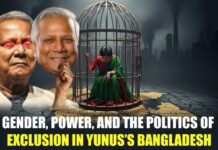Even before Puja, there has been a brutal attack on the country’s non-communal tradition and religious coexistence: in 13 districts—Kushtia, Chattogram, Kurigram, Satkhira, Jhenaidah, Netrokona, Gaibandha, Panchagarh, Jamalpur, Natore, Gazipur, Manikganj, and Chapainawabganj—idols have been vandalized and temples attacked simultaneously, exposing the depth of a planned conspiracy of division. Leaders concerned have alleged that breaking idols is not only an assault on religious consciousness but that fundamentalist groups are now openly displaying communal power with the direct patronage of the Yunus government.
For the past year, the Hindu community has been celebrating Puja under a blanket of fear. Due to militant threats, rumors, idol vandalism, and attacks on temples, minorities have been living in insecurity. What should have been a festival of joy has turned into a festival of fear. This fear is not just that of minorities—it is an attack on the existence and values of the entire nation.
Every idol broken, every temple attacked—these are not just shattered clay, but blows against our social bonds and the sovereign spirit of the Liberation War. Turning religious festivals into sources of fear and spreading deliberate rumors on social media are endangering the country’s unity and peace.
If the state and law enforcement remain silent, the situation will become even more dire. The attackers must be swiftly identified and brought to justice; the security of temples and places of worship must be strengthened; and effective measures must be taken to prevent rumors.
Beyond government action, social resistance is equally crucial. Without the united efforts of religious leaders, educators, the media, and civil society, it is impossible to preserve non-communal ideals.
The history of Bangladesh and the ideals of the Liberation War make it clear that fanaticism can never take permanent root in this country. This attack is not only against the Hindu community; it is a threat to the entire nation. Immediate remedial measures and restorative programs are now the urgent demand of the time.




